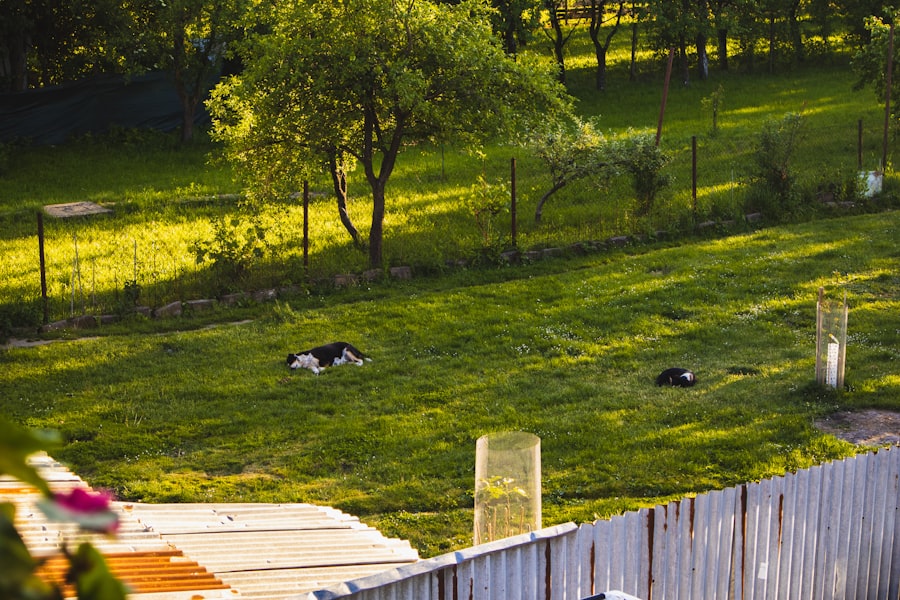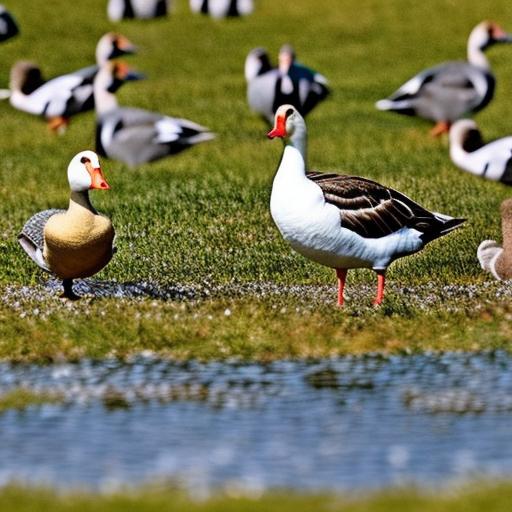Geese are a common sight in many residential areas, often seen grazing on lawns or swimming in nearby ponds. While they may seem harmless, the presence of geese can actually cause a number of problems for homeowners. It is important to manage geese in a humane and effective way to ensure the safety and well-being of both humans and geese.
Managing geese in residential areas is crucial for several reasons. First, geese can cause damage to property, such as tearing up lawns with their constant grazing or leaving droppings that can be unsightly and unsanitary. Second, geese can become aggressive, especially during nesting season, which can pose a threat to humans and pets. Finally, an overpopulation of geese can lead to an imbalance in the ecosystem, affecting other wildlife and vegetation.
Key Takeaways
- Geese can be a common problem in residential areas, causing damage and leaving behind droppings.
- Understanding the behavior of geese can help in finding natural and humane ways to keep them away from yards.
- Common problems associated with geese in the yard include nesting, aggression, and noise.
- Creating a physical barrier and using repellents, sound, and visual deterrents can help keep geese away.
- Educating neighbors and seeking professional help can also be effective in managing geese in residential areas.
Understanding the Behavior of Geese
To effectively manage geese in residential areas, it is important to understand their behavior and habits. Geese are social animals that typically live in large flocks. They are attracted to residential areas because they provide ample food sources, such as grassy lawns and nearby bodies of water.
Geese are also known for their territorial behavior, especially during nesting season. They will aggressively defend their nests and young, often hissing or charging at perceived threats. This behavior can be intimidating and potentially dangerous for humans and pets.
Common Problems Associated with Geese in the Yard
Homeowners often face a number of issues when dealing with geese in their yard. One common problem is the damage caused by their constant grazing. Geese have a voracious appetite and can quickly tear up a lawn, leaving it unsightly and difficult to maintain.
Another issue is the accumulation of goose droppings. Geese produce a large amount of waste, which can be unsightly and unsanitary. The droppings can also create a slip and fall hazard, especially on walkways or near entrances to the home.
In addition, geese can become aggressive, especially during nesting season. They may hiss, charge, or even bite if they feel threatened. This can be a concern for homeowners, especially those with small children or pets.
Natural and Humane Ways to Keep Geese Away
There are several natural and humane ways to deter geese from residential areas. One effective method is to use landscaping techniques that make the area less attractive to geese. For example, planting tall grasses or shrubs around the perimeter of the yard can create a physical barrier that discourages geese from entering.
Another option is to use noise deterrents, such as wind chimes or motion-activated devices that emit loud sounds when geese approach. These noises can startle the geese and encourage them to move on to a quieter location.
Additionally, there are natural repellents available that can be sprayed on lawns or other areas where geese are a problem. These repellents are typically made from natural ingredients and are safe for both humans and geese.
Creating a Barrier to Prevent Geese from Entering the Yard
Creating a physical barrier is an effective way to keep geese out of the yard. One option is to install a fence around the perimeter of the property. The fence should be at least three feet high and have small openings to prevent geese from squeezing through.
Another option is to use netting or wire mesh to cover areas where geese are likely to graze, such as flower beds or vegetable gardens. This will prevent them from accessing these areas and causing damage.
It is important to regularly inspect the barrier and make any necessary repairs or adjustments. Geese are persistent animals and may try to find ways around or through the barrier.
Using Repellents to Keep Geese Away

There are several types of repellents available that can be used to deter geese from residential areas. One option is a taste repellent, which is sprayed on grass or other areas where geese are a problem. These repellents have a bitter taste that geese find unpleasant, discouraging them from grazing in the area.
Another option is a scent repellent, which is sprayed on surfaces or placed in areas where geese are likely to gather. These repellents emit a strong odor that geese find unpleasant, causing them to avoid the area.
It is important to follow the instructions on the repellent carefully and reapply as needed. Most repellents need to be reapplied after rain or heavy watering.
Implementing Sound and Visual Deterrents
Sound and visual deterrents can be effective in deterring geese from residential areas. One option is to use devices that emit loud noises when geese approach. These devices can be motion-activated or set on a timer to create random sounds, which will prevent geese from becoming accustomed to the noise.
Visual deterrents can also be effective in deterring geese. One option is to use scarecrows or decoy predators, such as plastic owls or coyotes. These visual cues will make geese think there is a threat present and encourage them to move on to a safer location.
It is important to regularly move or change the location of these deterrents to prevent geese from becoming accustomed to them.
Educating Neighbors and Community Members on Geese Management
Managing geese in residential areas requires cooperation from neighbors and community members. It is important to educate others on the importance of managing geese in a humane and effective way.
One way to educate others is by sharing information through community newsletters or social media groups. This can help raise awareness about the problems associated with geese and provide tips for managing them.
It is also important to communicate with neighbors directly. Share your experiences and concerns about geese and discuss potential solutions. Encourage them to take action to manage geese in their own yards to prevent the problem from spreading.
Seeking Professional Help for Geese Control
In some cases, it may be necessary to seek professional help for geese control. This is especially true if the problem persists despite using natural and humane deterrents.
Professional geese control services have the knowledge and experience to effectively manage geese in residential areas. They can assess the situation, develop a customized plan, and implement strategies to deter geese.
It is important to choose a reputable and licensed professional who uses humane methods for geese control. They should also provide ongoing monitoring and maintenance to ensure long-term success.
Maintaining a Clean and Tidy Yard to Deter Geese from Nesting
Keeping a clean and tidy yard is an important step in deterring geese from nesting in residential areas. Geese are attracted to areas with tall grasses or shrubs where they can build their nests.
Regularly mowing the lawn and trimming shrubs will make the area less attractive to geese. It is also important to remove any standing water or debris that could provide a nesting site.
In addition, it is important to promptly clean up any goose droppings or other waste. This will not only make the area more pleasant for humans, but it will also discourage geese from returning.
Managing geese in residential areas is crucial for the safety and well-being of both humans and geese. By understanding their behavior and implementing natural and humane deterrents, homeowners can effectively keep geese away from their yards. It is also important to educate neighbors and community members on the importance of managing geese and seek professional help if needed. By taking action to manage geese in a humane and effective way, homeowners can create a safe and enjoyable environment for all.
If you’re looking for effective ways to keep geese out of your yard, you might also be interested in learning how to convert a shed into a chicken coop. This article from Poultry Wizard provides step-by-step instructions on transforming a shed into a safe and secure space for your chickens. By implementing the tips and techniques mentioned in this article, you can create a barrier that not only keeps geese away but also provides a comfortable environment for your feathered friends. Check out the article here to discover how you can repurpose your shed into a functional chicken coop.
FAQs
What are some common reasons why geese enter yards?
Geese may enter yards in search of food, water, or shelter. They may also be attracted to the grass and vegetation in the yard.
What are some effective ways to keep geese out of the yard?
Some effective ways to keep geese out of the yard include installing physical barriers such as fences or netting, using decoys or scare tactics, and removing any sources of food or water that may be attracting them.
Are there any natural deterrents that can be used to keep geese away?
Yes, there are natural deterrents that can be used to keep geese away. These include planting certain types of vegetation that geese do not like, such as prickly or thorny plants, and using natural repellents such as vinegar or garlic.
Is it legal to harm or kill geese that enter my yard?
No, it is not legal to harm or kill geese that enter your yard. Geese are protected under federal law, and harming or killing them can result in fines or other legal consequences.
What should I do if I encounter an aggressive goose?
If you encounter an aggressive goose, it is best to back away slowly and avoid making direct eye contact with the bird. Do not attempt to feed or touch the goose, as this can provoke it further. If the goose continues to be aggressive, it may be necessary to contact a wildlife professional for assistance.
Meet Walter, the feathered-friend fanatic of Florida! Nestled in the sunshine state, Walter struts through life with his feathered companions, clucking his way to happiness. With a coop that’s fancier than a five-star hotel, he’s the Don Juan of the chicken world. When he’s not teaching his hens to do the cha-cha, you’ll find him in a heated debate with his prized rooster, Sir Clucks-a-Lot. Walter’s poultry passion is no yolk; he’s the sunny-side-up guy you never knew you needed in your flock of friends!







